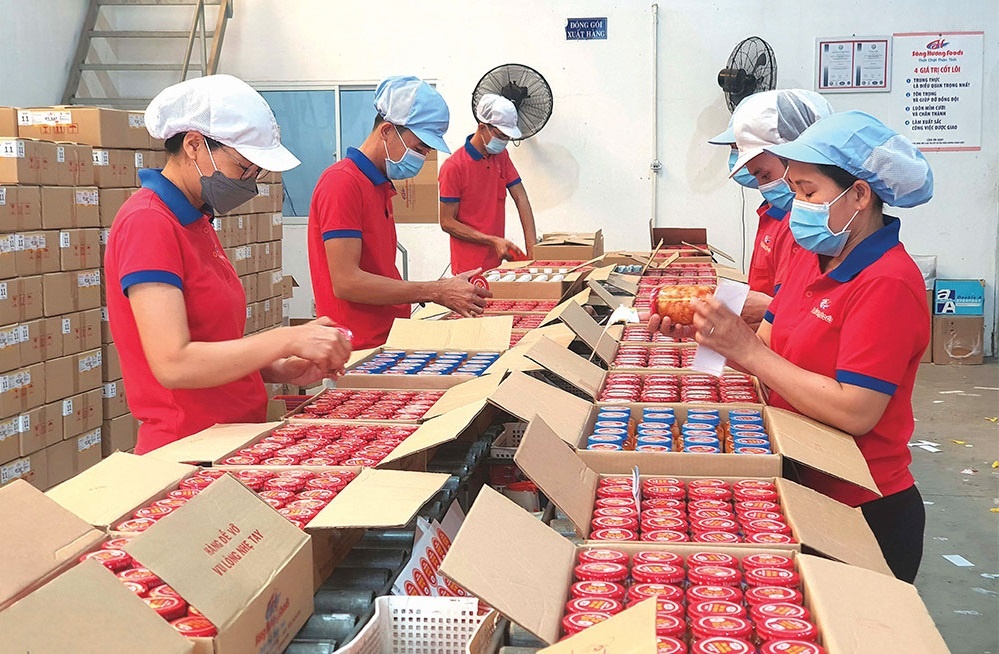Revival of businesses more achievable through support
The National Assembly (NA) has been looking at recommendations from lawmakers on continuing to provide assistance to the business community. Pham Trong Nghia, NA member from the northern province of Lang Son, said that amid global difficulties affecting Vietnam’s imports and exports, one of the best solutions is to increase domestic demand and develop the domestic market, with a continued reduction of taxes and fees for businesses.
“I agree with many NA members’ proposal that the VAT reduction of 2 per cent need to be extended until June 30, 2024, and I also suggested that the government direct the National Salary Council to negotiate with relevant stakeholders to increase basic salaries for factory workers from July 2024,” Nghia said.
In the middle of this year, the government, for the second time, issued a decree on decreasing VAT by 2 per cent on goods and services subject to a 10 per cent rate, valid from July 1 to December 31.
The new rate will not apply to telecommunications, financial activities, banking activities, securities, insurance, trading of real estate, metals, precast metal products, mining products, coke mining, refined oil, chemical products, and goods and services subject to excise taxes.
Deputy Duong Van Phuoc, NA representative for the south-central province of Quang Nam, underlined that the government should offer “more practical support packages” to enterprises.
“Businesses are suffering from grave shortages of capital, and the government needs to design preferential credit packages in service of production and business activities,” Phuoc said. “Right now, it is necessary to facilitate businesses to approach loans from banks via a reduction of lending rates and loosening borrowing conditions.”
 |
| Some regulations are stifling businesses from pushing forward or accessing capital, photo Le Toan |
For example, the 2 per cent lending rate support package via the commercial bank system for companies, cooperatives, and household businesses has seen a very low disbursement rate – at only about $32.95 million or nearly 2 per cent of the assigned total of nearly $1.7 billion.
It is expected that by late 2023, total disbursement may reach about $59 million, equivalent to only 3.5 per cent of the total.
“One of the main reasons behind the slow disbursement of this support package is that customers are afraid of inspections and examinations from banks. Additionally, to obtain loans from this package, beneficiaries must demonstrate their ‘recovery ability’ as a tough condition,” Minister of Planning and Investment Nguyen Chi Dung told the NA.
Like many other NA members, Phuoc also recommended that the State Bank of Vietnam (SBV) direct commercial banks to soon lower standards on assessing the debt repayment history of customers and businesses to reschedule debt, restructure, repay debt, and waive and reduce fees.
“The SBV also needs to issue unsecured credit packages suitable to the needs of customers and business models of businesses, accompanying and sharing risks for businesses,” Phuoc said.
The Ministry of Planning and Investment (MPI) reported that in the first 10 months of this year, about 81,000 businesses halted operations – up 22.1 per cent as compared to the corresponding period last year; 50,700 enterprises stopped operations and waited for dissolution procedures – up 25.9 per cent; and 14,700 completed such procedures. On average, about 14,700 businesses were kicked off from the market every month.
Deputy Thach Phuoc Binh, representing the Mekong Delta province of Tra Vinh, told the NA last week that along with the decline in orders, there is no market for products, and businesses are running out of capital, while corporate bonds and bank loans are due.
“What is more, besides problems in the consumption market, businesses also have to deal with the internal shortcomings of the economy, which are conflicting institutions and policies, and many existing business conditions are tough, making it hard for businesses to perform,” Binh said.
According to the World Bank, many enterprises are in the mire, meaning the government must take more sturdy actions to revive business confidence and production.
“While economic growth picked up in Q3 of 2023 thanks to a gradual recovery of the exports, domestic consumption remained subdued, and credit growth continued to be slow, reflecting weak private domestic investment and investors’ confidence,” the World Bank state in its October bulletin on Vietnam’s economic performance.
“A sharp upward trend in headline inflation continues to warrant close watch. Continued efforts to implement public investment could support aggregate demand and economic growth in the short run.”
The World Bank also suggested that a strategic and well-prepared investment pipeline for 2024 and the next Medium Term Investment Plan with a focus on green, resilient, and regional infrastructure will help bolster long-term economic development.
“Further improving the business environment and stepping up investment in human capital could help the country attract high-tech and high-value additional foreign direct investment (FDI) and boost productivity in the long run,” the bulletin read.
According to the MPI, cumulatively as of October 20, total newly registered and newly added FDI, and that from capital contributions and stake acquisitions hit nearly $25.76 billion – up 14.7 per cent on-year.
Total 10-month FDI disbursement reached an estimated $18 billion – up 2.4 per cent on-year, also the highest 10-month disbursement sum over the past five years.
| Nguyen Thi Hong, Governor State Bank of Vietnam
For the supply-related policy, at the beginning of the year, the SBV set a credit growth target of 14 per cent for the whole year. By the middle of the year, it allocated and notified all credit institutions in the entire system with a target of about 14 per cent - this is also a target set at the beginning of the year of 14-15 per cent. At the same time, the SBV has monitored flexibly to support the banking system’s liquidity to create conditions for credit institutions to promote the credit supply for the economy. Although global interest rates have increased, the SBV has adjusted the regulatory interest rate four times to reduce the interest rate of new loans by about 2 per cent compared to the end of last year. If we include the outstanding balance of old and new loans, the rate is down by about 1 per cent compared to the end of 2022. Compared to before the pandemic, it has returned to the same level, or even decreased by about 0.3 per cent. The SBV has issued a circular on restructuring debt repayment terms and maintaining the same debt group as well as proactively proposing credit packages, such as a $5 billion housing package for low-income people, and a credit package for seafood companies worth $632.9 million. All of these solutions have contributed to boosting credit demand. Tran Chi Cuong, National Assembly member Danang
Credit growth by late September only increased 5.91 per cent compared to the end of 2022. The economy is currently thirsty for capital but has difficulty in absorbing capital, although the SBV has reduced the regulatory interest rate, for four times, by 0.5 to 2 per cent a year, which shows that the production and business situation is facing many problems. At the same time, the ability of businesses to absorb capital also faces many obstacles, with lending interest rates remaining high, and the gap between the average lending interest rate and the average interest rate is still large. What is more, the lending mechanism is still complicated, reducing the attractiveness of loans. In many cases, enterprises’ ability to receive output orders is reduced, and then they no longer need to borrow capital. Along with this, the capital market shows signs of instability, with sharp declines. In addition, implementing the NA’s resolution on fiscal and monetary policies, as well as the 2 per cent lending rate support package disbursed via the commercial bank system, has proved difficult. Nguyen Thi Thu Thuy, National Assembly member Binh Dinh province
The nine-month figures for businesses dissolved, bankrupt, or withdrawn from the market was 135,100, lower than the total of 165,200 newly established and returned businesses. However, the total number of newly established enterprises decreased 14.6 per cent in registered capital and by 1.2 per cent in the number of employees. The large number of businesses withdrawing from the market are mainly found in the labour-intensive sectors of mobile phones and components, footwear, textiles and garments, and wooden furniture. Workers have lost their jobs in many industrial zones. The number of workers in industrial groups as of September 1 decreased 1.9 per cent on-year. This indicates that the number of businesses is theoretically increasing, but providing sufficient employment is still unstable. Authorities need to evaluate support packages for people and businesses to develop the economy. It is also necessary to research policies on tax reduction, debt rescheduling, cost compensation for businesses, and rescheduling contributions from businesses such as taxes and lending to businesses to pay salaries. |
 | Business support to boost 2024 goals With economic growth this year forecast to fall below the set target, the government has devised a new growth goal for next year, which will be realised by greater support for businesses. |
 | Supporting industry giants favour Vietnamese market In the last months of 2023, a lot of supporting industry giants have announced their strategies to penetrate the Vietnamese market, given the fact that the country has become a strategic destination in the global supply chain. |
 | Support necessary to boost green human resources A vibrant and dynamic vocational education and training system is crucial to Vietnam meeting its socioeconomic development goals. Jen Bahen, education and research counsellor at the Australian Embassy in Vietnam, told VIR’s Hoang Oanh about Australia’s support in vocational training and human resource building. |
What the stars mean:
★ Poor ★ ★ Promising ★★★ Good ★★★★ Very good ★★★★★ Exceptional
Related Contents
Latest News
More News
- PM outlines new tasks for healthcare sector (February 25, 2026 | 16:00)
- Ho Chi Minh City launches plan for innovation and digital transformation (February 25, 2026 | 09:00)
- Vietnam sets ambitious dairy growth targets (February 24, 2026 | 18:00)
- Masan Consumer names new deputy CEO to drive foods and beverages growth (February 23, 2026 | 20:52)
- Myriad risks ahead, but ones Vietnam can confront (February 20, 2026 | 15:02)
- Vietnam making the leap into AI and semiconductors (February 20, 2026 | 09:37)
- Funding must be activated for semiconductor success (February 20, 2026 | 09:20)
- Resilience as new benchmark for smarter infrastructure (February 19, 2026 | 20:35)
- A golden time to shine within ASEAN (February 19, 2026 | 20:22)
- Vietnam’s pivotal year for advancing sustainability (February 19, 2026 | 08:44)




 Tag:
Tag:




















 Mobile Version
Mobile Version